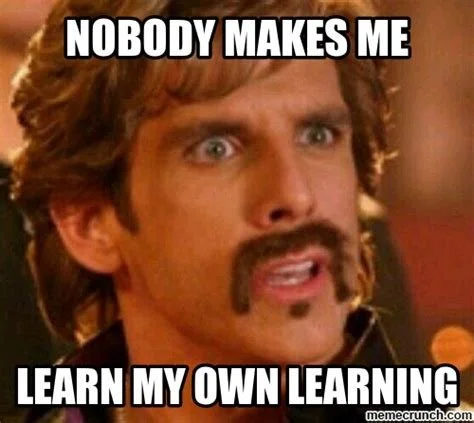The 3 Hardest Things About Learning as an Adult
It’s obvious but worth stating that the world is constantly changing. In order for us as individuals to keep up, we have to keep learning. Sometimes our hand will be forced and in order to get (or keep) a new position, we’ll have to improve our skills with new software or learning to code. Sometimes, our curiosity or desire will drive us. Like wanting to explore how to use AI, learning how to cook a new dish, or play the guitar.
But as an adult, creating both a mindset and environment conducive to learning is not as easy as it sounds; there are 3 things that are about to stand in your way. Here they are and some helpful ideas to overcome them.
Your Ego
It’s likely that in your adulthood you’ve grown confident in your ability and knowledge. As we get older and more practiced at our jobs, we tend to move on the spectrum from curious to expert.
Which means we stop asking questions and we feel like we have (or need to have) all the answers.
But what happens when you start learning something new is a hard truth: you’re going to suck at it at first. That can feel really hard for us. We’re used to being good, confident, experts. So when we start sucking, when we don’t know everything, it feels vulnerable and uncomfortable.
Tip: Create an ongoing list of questions.
Pick a place where you’re likely to check often– maybe a notebook you have with you or a notes document in your phone. The goal with this tip is to cultivate a beginners mindset and build a habit of asking questions. You might be used to having all the answers, but as you approach learning something new, think of yourself as a scientist. Or a kid. Or a detective. Something that helps you play the role of exploring more learning. Questions open doors which will motivate further learning.
The Dip
Part of any learning process is what author Seth Godin calls “The Dip.” It’s the part of doing something new when the novelty wears off, excitement fades, and incremental improvement stops and the results dip. It’s when you’re learning piano and you’ve CRUSHED “Mary Had a Little Lamb” and now you have to learn your next song playing with both hands. When you’ve coded a simple website and then you have to add some interactivity. It’s when the work starts to get hard and less fun. This is when most people quit. But the challenge– actually, the invitation– is to stick with it. The rewards, exponential growth, expertise lie on the other end of the dip.
Tip: focus on showing up regularly, not on outcomes.
If you set aside time every day or at the very least once a week for learning, it doesn’t matter if today was a bad day or you feel demotivated. You showed up. That’s what professionals do. Even when it gets hard… especially when it gets hard.We don’t have hours of time to learn like when we were in school.
Unstructured Time
We don’t have the structure of curricula and teachers waiting for us when we show up. Much of our learning is self-guided. And that can be challenging because we have to be both the teacher and the student.
Tip: spend some time creating structure.
Set a few goals. Find or build a curriculum to break down the learning into pieces. And, if you want to take tit to the next level (and save yourself some time and effort, ask ChatGPT to do it for you.
Learning is such an important part of life that it’s worth considering how we get better at it.
Good luck out there, I hope this helped.
Caveday is a company aimed at improving your relationship to work. We write regular posts on Medium and send out monthly newsletters with productivity tips, life hacks, and recommendations. Sign up for the mailing list here.
Jake Kahana is a cofounder of Caveday. Sign up for his personal emails, called “The Email Refrigerator” here.




